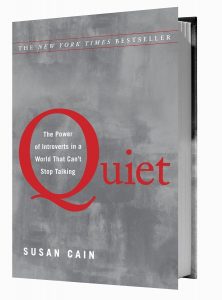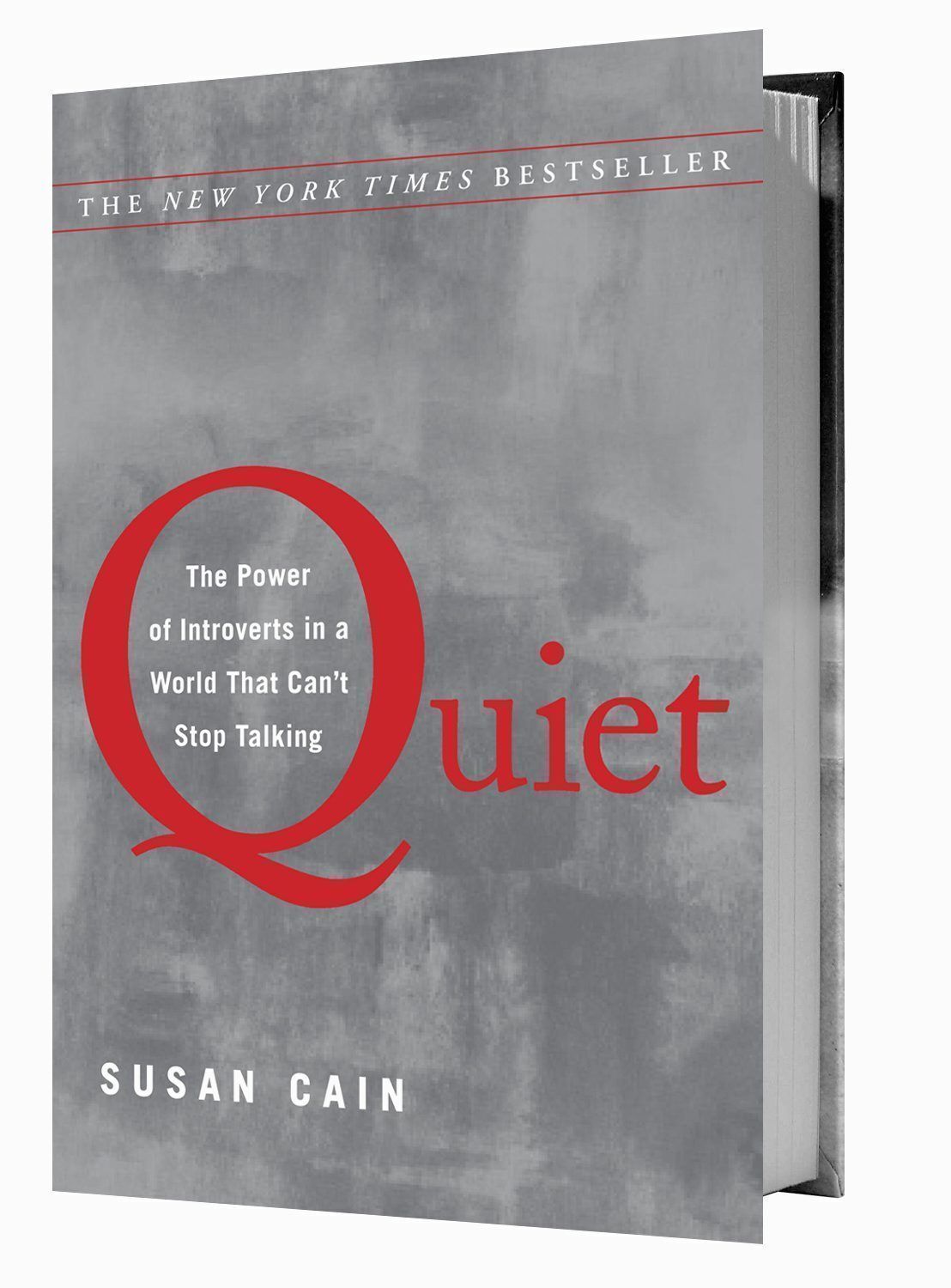
Sometimes stating something obvious can be profound. Susan Cain’s Quiet: The Power of Introverts in a World That Can’t Stop Talking is filled with many such statements. Never have I read a book with so many logical, reasonable assertions that nonetheless changed my world view. Maybe it’s because I never really took the time to think about introversion and extroversion. Thankfully, Susan Cain did.
In her wide ranging book on all things introvert/extrovert, Quiet not only made me think, but it left me with practical life skills. And that is what I loved most about this book. Don’t get me wrong, exploring the depths of the mind and philosophical reasoning is great, but a book that actually gives you the tools to change things is a rare treat.
Being an introvert, this book spoke to me. For most of my life, I have felt that introversion is a bad thing, something to overcome. If I had a nickel for how many times I myself have been called quiet, I would be a rich man. But Cain argues that introversion is just as valuable as extroversion in everyday life, each with their own strengths and weaknesses.
We Live in an Extroverts World
Quiet is filled with statements that are inherently obvious once they are read aloud. For example: How much someone talks is in no way related to how intelligent they are. Of course, that much is obvious. How many times have you heard someone confidently speak about a topic you know intimately, only to realize the speaker is actually uneducated on the topic? I think for many people, this is a common occurrence.
Yet, when someone speaks confidently, we believe them. They might even make us doubt ourselves. “I thought I knew the answer, but this guy is so sure that I must be wrong.” The consequences of this are incredibly fascinating. And who are these people who speak so much? Extroverts.
If we tend to believe folks who speak often and speak confidently, despite their actual knowledge, then it is extroversion that leads society, not knowledge and wisdom. That is immediately apparent to many people within their personal lives and workplaces. We watch as charismatic people rocket up the ladder while quiet and thoughtful types are passed over. Knowledge is not as valued as confidence in an extroverts world. A generalization to be sure, but not wholly untrue.
Brainstorming is Basically the Worst
I was especially enamored with Cain’s examination of group work and how often we are set up to fail. Quiet looks at a few different studies focusing on how groups of people formulate ideas. Which ideas float to the top and which are discarded? I’m sure you’re sensing a general theme…
When groups of people work together, extroverted individuals are much better at expressing and arguing for their own ideas, whether or not they are the best. We see when people are physically gathered, ideas put forth by introverts are not likely to gain as much traction. Once again, extroversion leads the way despite the value of their ideas.
But this isn’t because extroverts are just a bunch of meanies and introverts can’t take the heat. Extroverts are simply better suited to spontaneous environments, whereas introverts (or even people in general) tend to work much better when given time to concentrate and formulate ideas. Not only are we only listening to the most confidently spoken ideas, we aren’t even getting the best ideas possible out of the group.
The next time you are having a meeting at work and beginning to brainstorm from scratch, the outcome isn’t going to be the best possible. Cain argues that instead of coming in blank, individuals should be given time to formulate their own ideas/answers beforehand without influence from others. Only then can we hope to bring the best ideas to the table.
Relationships and Expectations
Another thing I’m taking away from Quiet is a deeper understanding of how introverts and extroverts interact and the expectations of each. I feel that this is another one of those “fairly obvious” statements in the book that is still profound. Introverts and extroverts view the world in vastly different ways and require different things to be comfortable.
Extroverts thrive on socialization. It gives them energy. Introverts thrive in more intimate settings. Large, high energy environments drain introverts. Yet we often find that we are attracted to our opposites or that our children are the opposites of us. We don’t live in a world where we put the extroverts on one side of the room and the introverts on the other. Nor should we. We need to recognize one another’s needs if we hope to having fulfilling relationships.
Your child might not be having social issues, they just may not be thriving in an incredibly extroverted public school system. Your partner doesn’t like his friends more than you, he only requires more socialization to be fulfilled in life. We need to look deeper than the surface when it comes to conflicts in socialization. One size doesn’t fit all.
Simple things like compromise and understanding can make a great impact on our relationships. Recognize that different is not bad. Introversion and extroversion can and should live in harmony.
We Aren’t One or the Other
Life is never black and white and neither is introversion and extroversion. Cain describes us as a rubber band. We tend to lean more towards one end of the spectrum or other, but we can twist and pull ourselves in various directions. Introverts don’t have to be bad public speakers. Extroverts don’t have to hate quiet spaces. We can of course learn skills outside of our own comfort zone.
But it is also important to understand ourselves so that we know where we best thrive. As an introvert myself, I am often in situations where I must lead meetings or speak in public. I like to think I’m good at it. I don’t even dread it. But it is not a situation that energizes me. It wipes me out. When I have a day that involves a lot of interaction, I need my quiet time after.
I think Cain does a really good job at not arguing for one “side” over the other, because again, there aren’t really sides. Most people fall in the middle. Introverts and extroverts both have weaknesses to overcome and both have strengths on which to build.
Embrace Yourself
My biggest takeaway from this book is simply to embrace yourself. Introversion is not something to be overcome or pushed away. Cain argues it is just as important as extroversion in society. Recognize your inherent weaknesses, but also recognize that gives you many strengths.
I’ve used the word obvious a few times but I don’t mean it in a derogatory manner. The most amazing lessons in life sound obvious once you hear them. And that is what Quiet is, something so relevant, engaging, and useful that it sounds obvious.
Purchasing Quiet: The Power of Introverts in a World That Can’t Stop Talking from Amazon helps support Tome of Nerd.
